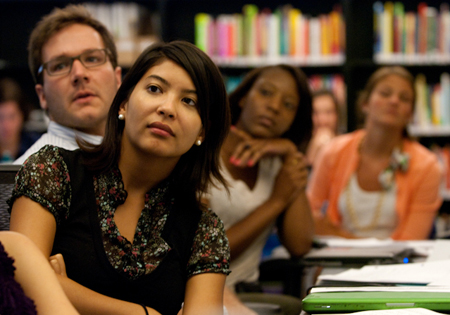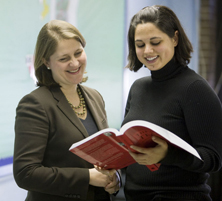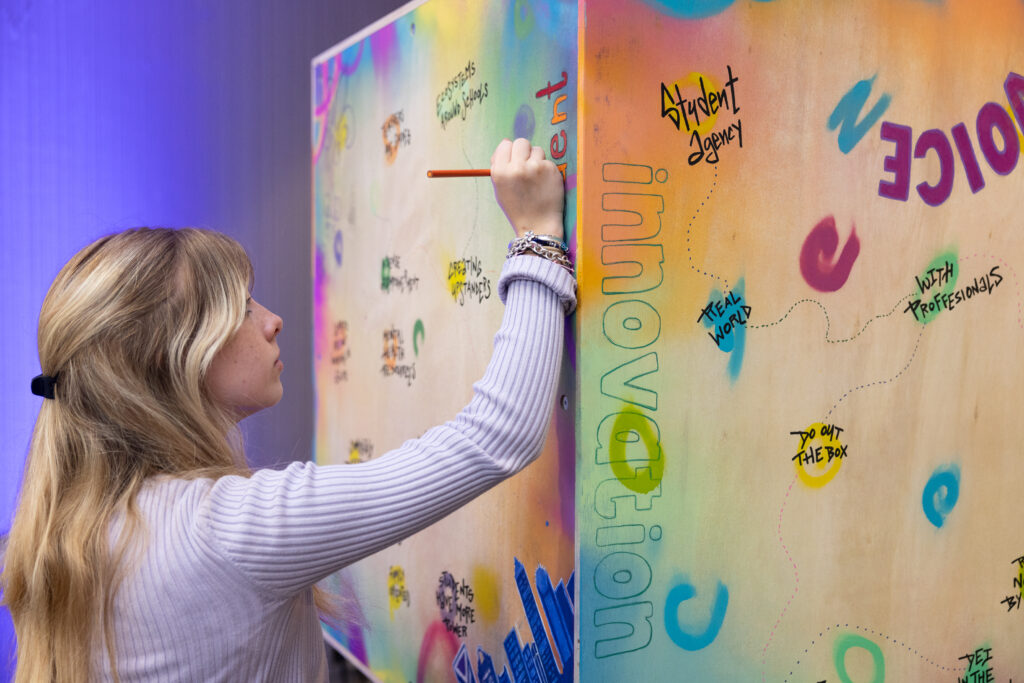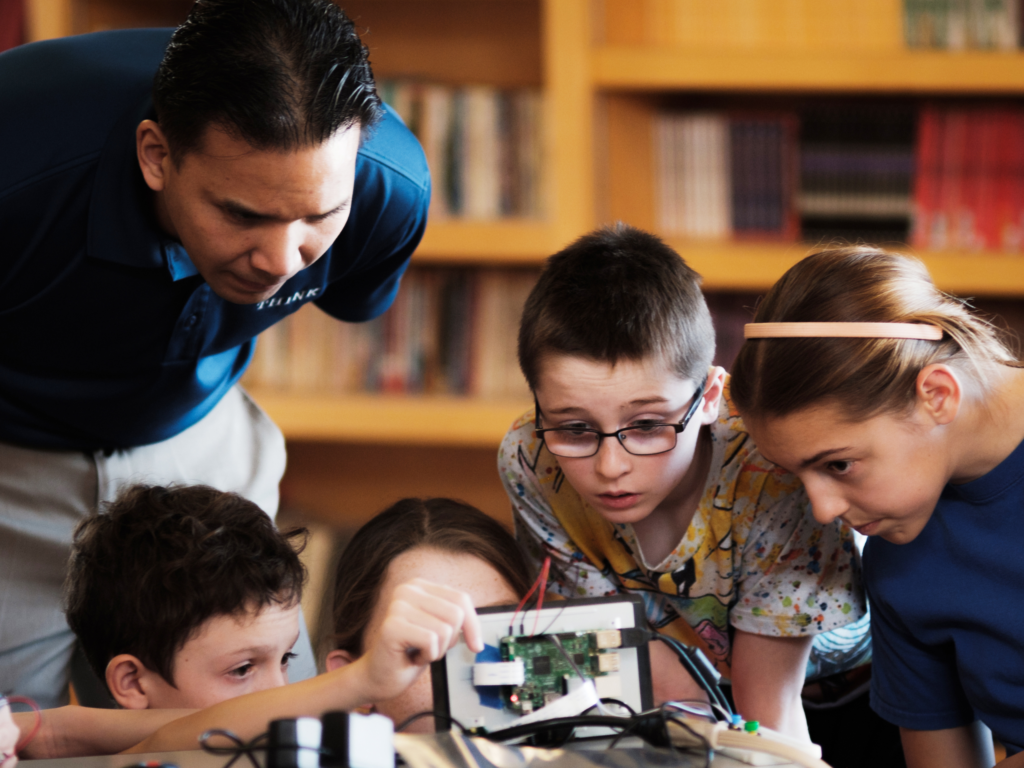Education reform hardly qualifies as the most exciting news with an Aspen dateline this week. In fact, the Aspen Ideas Festival* didn’t even have an official education track this year. But that didn’t keep the Festival – an annual gathering that represents the high-altitude pinnacle of influential thinking –from making news in the education world.
The Festival featured no fewer than three sessions on the potential of technology to bring disruptive innovation to education; one of those sessions featured NewSchools CEO Ted Mitchell, along with American Federation of Teachers president Randi Weingarten, US Department of Education Chief of Staff Joanne Weiss, and ePals CEO Miles Gilburne. Indeed, education technology was a major focus; the AFT was a sponsor of the Festival, and Weingarten spoke frequently about the investment of the AFT – the country’s largest teachers union – in lesson sharing technology. (From our vantage point as investors in a competing system, we’d say teachers have better options for sharing lessons – but that’s a discussion for a different day.) That tech focus matters, because it’s vital to the larger point that’s coming here, about teachers, innovation, and reform.
 Teachers, innovation and reform undergirded a 2400-word meditation on education politics from Felix Salmon, a blogger for Reuters (actually, the blogger for Reuters – they may be the biggest information company in the world, but he is their sole official blogger). Salmon attended the festival, including a private lunch on education innovation hosted by the AFT and The Atlantic, and wrote up the piece on school reform politics in the airport lounge on his way home.
Teachers, innovation and reform undergirded a 2400-word meditation on education politics from Felix Salmon, a blogger for Reuters (actually, the blogger for Reuters – they may be the biggest information company in the world, but he is their sole official blogger). Salmon attended the festival, including a private lunch on education innovation hosted by the AFT and The Atlantic, and wrote up the piece on school reform politics in the airport lounge on his way home.
Salmon is well-awarded (one of TIME’s 25 best bloggers, among other awards), smart and good company, but I take issue with a crucial point in his essay:
It seems to me that although there are always tensions between the management and the unions, the real fight here is between the teachers and the reformers. Both sides try to capture the management, with various degrees of success, and the result is all too often unhelpful fights and squabbles rather than constructive engagement and grown-up attempts to make sustainable and incremental progress.
Salmon’s point fits into a narrative that’s increasingly popular, problematic, and, I think, false: that “reformers” and teachers are natural enemies. The “reform” side, as it’s been called over the past several years (there are worse labels), is not monolithic, but is generally applied to those of us who, roughly speaking, believe education will be improved by:
- accountability for student learning at many levels—school systems, schools, and teachers
- public school choice, especially charter schools
- disruptive innovation, meaning new, ultimately more effective and/or efficient ideas and processes that offer alternatives to, and ultimately disrupt, established processes
- Alternative, entrepreneurial routes for teacher preparation (examples range from Teach For America to Relay Graduate School of Education)
- the participation of entrepreneurial organizations, nonprofit and for-profit, that bring innovative approaches, autonomy and accountability to solving key problems in public education
- commitment to a core belief that public schools can make a major difference in life trajectories in low income communities
Fundamental to most, or maybe all, of these points is a belief that teachers are incredibly powerful. Studies demonstrate that the effectiveness of the teacher has enormous influence over a student’s academic and life trajectory, and that the quality of teaching makes more difference than anything else inside of a school. In the past several years, folks on the “reform” side have been vocal in pushing systems to turn that understanding into action, probably most powerfully through a seminal 2009 report from The New Teacher Project (a NewSchools venture) called the Widget Effect. That report has helped to drive a widening consensus that our school systems need to be better at recognizing various levels of teacher performance, and reacting accordingly – to figure out which ones should be models for others; which ones are doing fine; which ones need support, and which few are not benefiting students and should leave the profession.
 Unfortunately, it’s that last category that got all the attention from critics. Reuters’ Salmon, when we talked about this a bit, wouldn’t budge from his conviction that the reform push is basically about firing teachers. To be clear, I’m not claiming that removing ineffective teachers isn’t part of the equation; as a former teacher, I can say with certainty that pretty much every teacher knows a teacher who shouldn’t be in the profession – a point on which AFT’s Weingarten vocally agrees. It’s just not the main point. Much more important is recognizing the enormous impact of teachers, and creating training and professional structures that will help them get better at their jobs faster, and help teaching to be recognized as the profession it is. Yet somehow, the same “reformers” who are the greatest advocates for the power of teachers have been cast as the teachers’ enemy. For these critics, “reform” is simply a matter of blaming teachers for poor results and firing them. Some of these critics even go so far as to suggest that schools and teachers can have little impact on poverty – a profoundly depressing view of the potential of teachers in low income schools.
Unfortunately, it’s that last category that got all the attention from critics. Reuters’ Salmon, when we talked about this a bit, wouldn’t budge from his conviction that the reform push is basically about firing teachers. To be clear, I’m not claiming that removing ineffective teachers isn’t part of the equation; as a former teacher, I can say with certainty that pretty much every teacher knows a teacher who shouldn’t be in the profession – a point on which AFT’s Weingarten vocally agrees. It’s just not the main point. Much more important is recognizing the enormous impact of teachers, and creating training and professional structures that will help them get better at their jobs faster, and help teaching to be recognized as the profession it is. Yet somehow, the same “reformers” who are the greatest advocates for the power of teachers have been cast as the teachers’ enemy. For these critics, “reform” is simply a matter of blaming teachers for poor results and firing them. Some of these critics even go so far as to suggest that schools and teachers can have little impact on poverty – a profoundly depressing view of the potential of teachers in low income schools.
What’s created a new chapter in this conversation is the boom of activity in the world of education technology. A huge swath of the new products and tools coming to market are aimed at helping teachers—and teachers are, in many cases, way out ahead of the systems they work for in adopting these tools. These technology tools enable teachers to use their time more efficiently, and increasingly, to do things in the classroom that are otherwise very difficult, such as grouping kids flexibly for different lessons. In essence, they leverage teachers’ talents in ways that benefit both teachers and kids. By and large, the “reform” side of the conversation has been excited about the potential of this new generation of technology, and NewSchools is among those that are actively investing money and time to help the best products grow and reach schools in low-income communities. It’s the reverse of Salmon’s teacher-reformer fight—it’s an alliance that recognizes and increases the power of great teachers.
The conversation with Salmon came to mind earlier this week, after I returned from Aspen and was listening to a pitch at NewSchools from a nascent education technology entrepreneur. Without getting into details, the pitch was for a tool that will help students learn at their own pace, and have more fun doing it; and at the same time, will return vital information to teachers about how their students are progressing and engaging, at school and at home. It was the sort of tool I could only have dreamed of when I was a classroom teacher. If it succeeds – and I think it will – it will become one of thousands that help teachers leverage their time and skills. It’s just one example of the ways in which the teacher-reformer “fight” turns out to be exactly the wrong lens.
Here’s to what Salmon might call “constructive engagement.”
PS: Probably the biggest education news to come out of the Festival was a different Weingarten announcement – a proposal for a “bar exam” for teachers to enter the profession. As Andy Rotherham notes, the idea dates back to when Al Shanker held the AFT president’s position in 1985, and he smacks me around a little bit for treating it as news that Weingarten has put the idea forward again. But in this age of accountability, it will be interesting to see whether it gets legs this time.
*Disclaimer: NewSchools works with the Aspen Institute, which organizes the Aspen Ideas Festival, on the NewSchools Summit.


